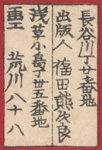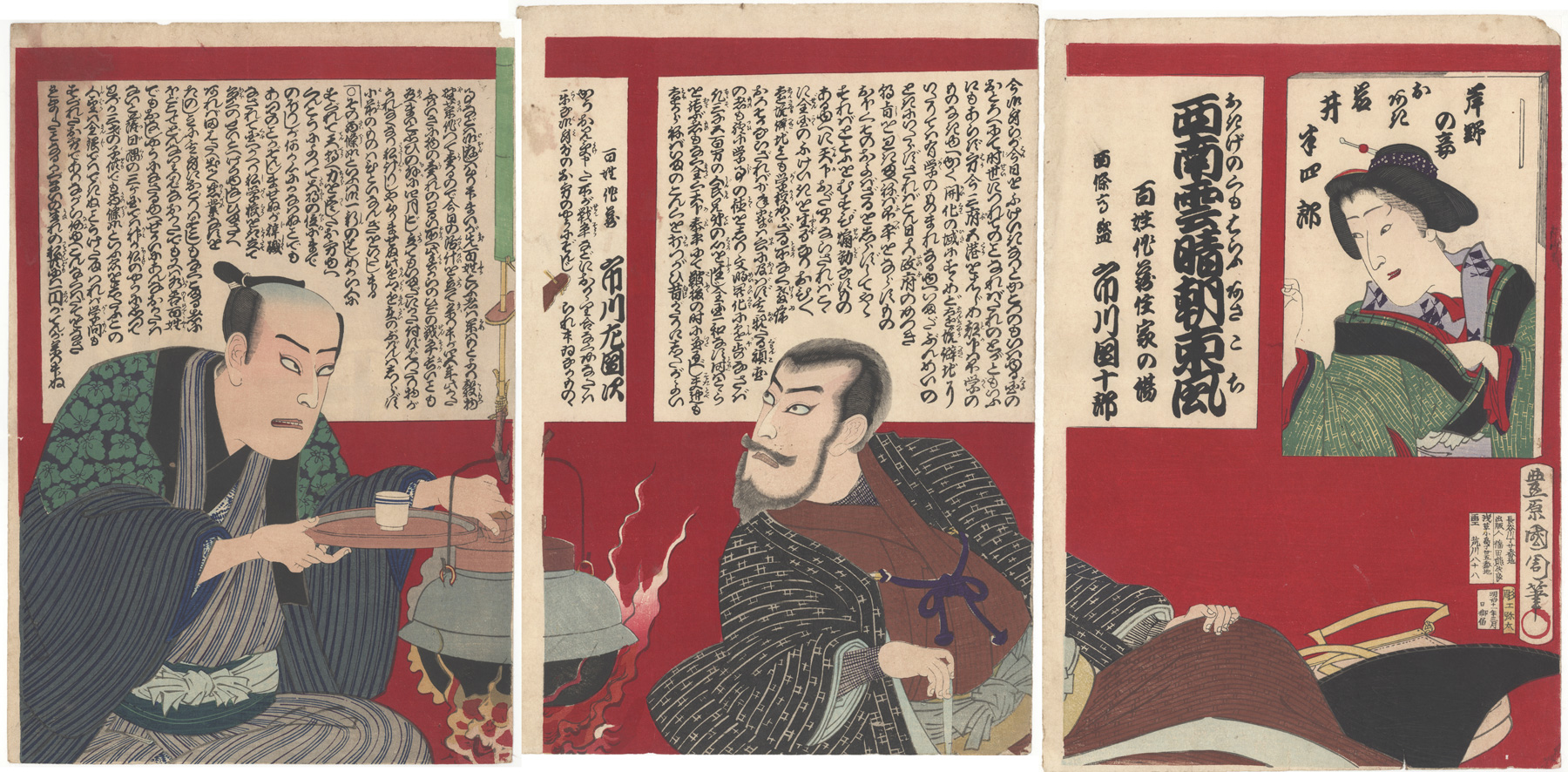About This Print
From right to left, the actors Iwai Hanshirō VIII 岩井半四郎 as Aki the mistress of Kishino Toshiaki 岸野の妾おあき (the mistress of Kirino Toshiaki in real life); Ichikawa Danjūrō IX 市川団十郎 as Saijō Takamori 西條高盛 (Saigō Takamori in real life) and Ichikawa Sadanji 市川左団次 as Hyakushō Sakuzō 百姓作蔵 in the play Okige no kumo harau asagochi (The Morning East Wind Clearing the Clouds of the Southwest), written by Kawatake Mokuami (1816-1893), produced by Morita Kanya (1846-1897) and performed at Morita's Shitomi Theater in February 1878. The background text is dialogue between Danjūrō's character and Sadanji's character.
Significant national events could now be put on stageimmediately. In March 1878, for example,Kanya staged at the Shintomi-za a dramatization of the Satsuma Rebellion, whichhad ended in the rebels’ defeat just months earlier. Mokuami, the Shintomiza’s resident playwrightat the time, provided stirring contemporary roles for Danjūrō IX (as Saigō Takamori) and Kikugorō V (asShinowara Kunimoto). The play’s title, The Morning East Wind Clearing the Clouds ofthe Southwest (Okige no Kumo Harau Asagochi), referred to southwesternKyūshū’s Satsuma clan being overcome by the fresh breezes from the easterncapital, that is, Tokyo. The scenes ofmodern warfare, with exploding artillery shells (simulated by fireworks) andgunfire, were a great success and earned Kanya a healthy profit. It was an extremely important step towardcontemporary realism for so recent a historical event to be quickly dramatized,with all the historical names intact.2
The Actors Pictured
今御身らが今日をふけいきなりとかこつのも いハゆる國のおとろへにて時世につれてのことなれバ たれのとがともいふにもあらず 方今三府六港をはじめ都下ハ不学のものなきゆへかく開化の域にすすめど 遠境僻地にいたりてハ有学のものまれなるゆへ いまだぶんめいのときにいたらず されバこん日大政府のあつき朝肯をわきまへざれバ不平をならすものおほく そのおよバざるをしらずしてやくすれバととふをむすび煽動なすものあるゆへに 天下おだやかならされバここに全国のふけいきを生る(しょうずる)なり おひおひ遠境僻地をも学校あらざる所なく教喩おろそかならざれバかね輩ハ云ふに及バず其親たる頑固の者も終に学事の徳をしり 文明開化に進歩なさバ 凡(およそ)三千五百万の人民兄弟の心を生じ 全国一和なす時ハととうを結ぶ者もなく 全く天下泰平にて鼓腹の時にいたるべし 夫とても遠からざれバいまのこんくを打(うち)つがひ昔かたりにしたがよい
百姓作蔵 市川左團次
かうお見受申た所が戦争などにおかかり合なく あなたハ楽な御身分のお方のやうにぞんじられます ゐなかものの事などハ御存じハありますまいが 先(まず)百姓といふ者ハ米ハもとより穀物野菜作つて売るので今日の活計を立て参りますが 四五年此かたふけいきに物の売れのわるい所へ此春からのひごの戦争 長いことも有まいと思ひの外(ほか)に四月ごし立てもいまだにかた付ず ばつたり物がうれなくなり私計りじゃありませぬ 此近郷近在のぶげんハしらず 小前のものハひといなんぎをいたしまする
◦ヿその西條卿といふハ御一新のはじめから人にすだれて天朝へ力を尽くしたお方ゆへ くんこうによつて大将の位にまでのぼりしが 何か心にかなハぬことでもあつてのことかぞんじませぬが 辞職なされて国へかへり 私学校を取立て(とりたてて)多くのせいとへけうゆ(教喩)なし ひまさへあれバ田はたへ出て農業なすをたのしみに その身におごりハすこしもなくこまる者にほどこして どんなりつぱなおかたでも又ハ水呑百姓でもおなじやうになさるゆへ せかいにあんなおかたハないと薩日隅の三ヶ国でハ邦の仏のやうに思つて わづか三才の子供でも西條卿といふ名をしたふこの人望ハ金銀でハできぬこと うけたまハれバ学問もすぐれたお方でありながら何ゆへこんなくハだてをなされましたことなるか ぐまいの生れの私共にハ一円がてんが着ませぬ
Print Details
| IHL Catalog | #1276 |
| Title (Description) | The Morning East Wind Clearing the Clouds of the Southwest 西南雲晴朝東風 (おきげのくもはらうあさごち) Okige no kumo harau asa kochi |
| Artist | Toyohara Kunichika (1835–1900) |
| Signature |  |
| Seal | red Toshidama seal beneath signature |
| Publication Date |  明治十一年三月 日 御届 |
| Publisher |  Right cartouche - 長谷川丁廿番地 - Hasegawachō 20-banchi [publisher's address] 出版人 福田熊次良 - publisher Fukuda Kumajirō Left cartouche -画工 荒川八十八 浅草小島丁丗五番地 - artist's name Arakawa Yasohachi [the artist's given name] Asakusa Kojimachō 35-banchi [artist's address] |
| Carver |  |
| Impression | excellent |
| Colors | excellent |
| Condition | fair - almost full size; separate sheets; not backed; small tears and holes; corners of some margins missing |
| Genre | ukiyo-e; nigao-e; yakusha-e |
| Miscellaneous | |
| Format | vertical oban triptych |
| H x W Paper | (R) 14 3/4 x 10 in. (37.5 x 25.4 cm); (C) 14 3/4 x 10 1/8 in. (37.5 x 25.7 cm); (L) 14 1/2 x 9 7/8 in. (36.8 x 25.1 cm) |
| Literature | |
| Collections This Print | Shizuoka Prefectural Central Library K915-108-025-025; The Tsubouchi Memorial Theatre Museum of Waseda University 101-5271, 5272, 5273 |


